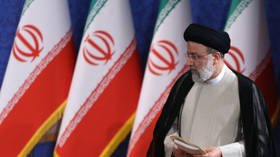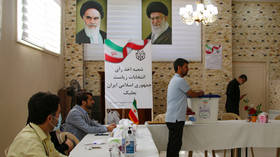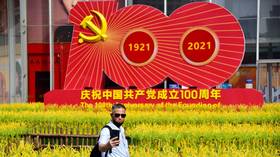Will Iran’s new president fuel conflict or make deals?

Ebrahim Raisi’s election in Tehran risks escalating strife with Iran’s global and regional adversaries. But there is also the chance that, under his leadership, he will have the scope to smooth the friction with foreign foes.
The victory of Ebrahim Raisi, the current chief justice of Iran, in the recent presidential election went along expected lines. As the favourite of the Supreme Leader Ayatollah Ali Khamenei, an experienced insider supported by key state institutions of the Islamic Republic, and a cleric with a huge following among conservative Iranian citizens, Raisi’s ascent to the high office was no surprise. With the 82-year-old Khamenei looking to steer his political succession and consolidate the Iranian state structure, he took no chances, and ensured Raisi came out on top.
But while Raisi’s rise was foretold, the big question is how his presidency will impact Iran’s foreign relations. Will he stabilise its relationships with global and regional powers or make them more volatile? The answers lie not just in Raisi’s own views or calculations, but also in how external powers respond and react to his moves.
Back to “heroic flexibility”
The labels ‘hardliner’ and ‘reformist’ convey key differences in outlook. But both ‘ultra-conservatives’ such as Raisi and ‘moderates’ like the outgoing president, Hassan Rouhani, are the yin and yang, or good cop and bad cop, who coexist under the shade of the clerical establishment’s canopy. Whatever change we will see in Iranian foreign policy under 60-year-old Raisi will fall within the broad parameters set by Khamenei, whose 32-year-long tenure as supreme leader has witnessed many gear shifts when it comes to the outside world.
Raisi’s vow to remain “committed” to a revived nuclear agreement being thrashed out in Vienna by the US and Europeans and the Rouhani government, and his comment that “if the interests of the nation are secured”, he would “definitely have a positive viewpoint” on any contract signed with the Western powers, indicate there is a pragmatist wrapped in the persona of a man described as “Ayatollah Ebrahim Raisi” in Iran’s state media and a likely successor to Khamenei himself.
The same “heroic flexibility” invoked by Khamenei in 2015 to sign the deal with the US is back in vogue in Tehran now, driven by the severe economic distress the country has suffered since the nuclear deal was torpedoed and sanctions were reimposed by former US president Donald Trump in 2018.
Raisi represents the Islamic Republic’s ideology of viscerally mistrusting America, but with three-and-half years left in the Biden presidency, there is a sufficient window of time in which to reap the dividends of lifting the American and European sanctions that have crippled the Iranian economy. With the voter turnout in the latest presidential election down to a historic low of 48%, Raisi has to revive public faith in the ‘system’ by getting Iran out of its rut, even if it requires holding his nose and cooperating to an extent with America, the “Great Satan”.
During the election campaign, Raisi argued that he could implement a renewed nuclear deal from a position of greater state strength compared to Rouhani. This is because Raisi’s presidency will be able to close the gaps and cracks among the clerics, the military, the revolutionary guards (IRGC), the legislature and the judiciary in the Iranian polity. The Islamic Republic will speak with one voice and make it more palatable to the right-wing to swallow its pride and restore the nuclear deal.
Also on rt.com The United States rejoining the Iran nuclear deal is a good thing, right? Well, not necessarilyAdvancing regional power
But if the Khamenei-Raisi combination will reinstate the nuclear deal with the West, it will not accept limitations to Iran’s regional standing and power projection. US Secretary of State Antony Blinken is aiming for a “longer and stronger agreement” with Iran to address not only its nuclear programme, but other “deeply problematic” issues, like its ballistic missile development and its array of armed allies in the Middle East, such as Hezbollah in Lebanon, Hamas in the Palestinian territories, the Houthis in Yemen and the Shiite Popular Mobilization Forces militias in Iraq.
American attempts to get Iran to soft-pedal its financial and military assistance to these groups – which form the core of Tehran’s ‘axis of resistance’ against the US, Israel and Saudi Arabia – will not be palatable to the conservatives who form Raisi’s political base.
The close association Raisi had with the US-assassinated General Qassem Soleimani of the IRGC, who had skillfully elevated Iran’s proxies across the region, stands in contrast to Rouhani, whose foreign minister, Javad Zarif, complained in leaked recordings that diplomacy was being “sacrificed” for the sake of “field operations” by the IRGC throughout the Middle East.
Under Raisi – whose nationalist constituents hold deep grudges against Israel, Saudi Arabia and the US over covert attacks and sabotage missions against Iranian targets – one can expect the IRGC and its network of proxies to push back more forcefully against provocations, with little internal dissent or pauses involving Iranian moderates or civil society.
Already in the first half of this year, Saudi Arabia is said to have been hit by more than 100 aerial attacks from Iran-aided forces. And as the 11-day war of rockets and airstrikes between Hamas and Israel in May showed, Iran is not going to pull any punches against its regional nemeses or drop its claim to be the main anti-status-quo power in the Middle East.
The opponents’ choices
As Israel and Saudi Arabia are going to be in the crosshairs with a greater sense of retribution under the Raisi-Khamenei duo, much depends on how these two de facto allied countries recalibrate their policies.
Following Raisi’s win, Israeli Foreign Minister Yair Lapid publicly declared that Jerusalem was determined to “immediately halt Iran’s nuclear program and put an end to its destructive regional ambitions”. And the Israeli security apparatus warned that Raisi’s election had left it “no choice but to go back and prepare attack plans”.
Even if the Biden administration might advise Israel not to rock the boat of the nuclear talks or resort to pre-emptive military options that could set off a violent spiral, intensified friction between Iran and Israel seems guaranteed.
The Saudis have not openly lambasted Raisi or threatened further payback against Iran, partly because they lack the firepower and self-confidence that Israel has in its military superiority. Since Riyadh is dependent for security on Washington, it is less inclined to go on a warpath against Tehran without American blessings.
The recent removal of hi-tech US weaponry from bases in Saudi Arabia and other Gulf nations, and secret talks between Saudi and Iranian officials to lower the heat in the region as a nod to the Biden administration’s desire for moderation, indicate that Riyadh is no longer itching for a showdown.
Saudi Crown Prince Mohammed bin Salman’s conciliatory turn in April that “Iran is a neighbouring country and all that we hope for is to have good relations” could be sustained even with Raisi replacing Rouhani, although much depends on whether Tehran refrains from hurting Saudi core infrastructure such as oil facilities, the royal family’s assets and Saudi-backed militias in the region.
Overall, the Raisi presidency is guaranteed to be harsher and sharper in asserting and regaining Iran’s influence and stature in the Middle East. But since the right wing has consolidated control over all layers of the Iranian state, Raisi is also best positioned to make tactical bargains with Iran’s foreign opponents in order to prolong the life and legitimacy of the Islamic Revolution.
Think your friends would be interested? Share this story!
The statements, views and opinions expressed in this column are solely those of the author and do not necessarily represent those of RT.
















